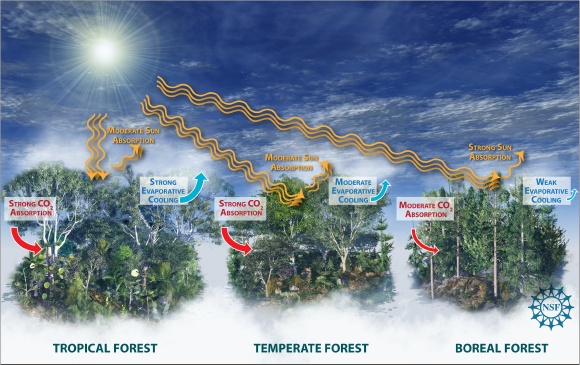With the proper spin, forests can be the cause of global warming. They produce methane. American environmentalists have an irrational dislike of nuclear power so they forced America to use more coal so they can be blamed for the spike in CO2.
It takes understanding to go beyond perspective and detailed analysis of the forests impact on climate change is still sketchy. There are roughly 42 million square kilometers of forest on Earth, a swath that covers almost a third of the land surface, and those wooded environments play a key role in both mitigating and enhancing global warming.
The teeming life of forests, and the physical structures containing them, are in continuous flux with incoming solar energy, the atmosphere, the water cycle and the carbon cycle--in addition to the influences of human activities. The complex relationships both add and subtract from the equations that dictate the warming of the planet.

"In the Amazon, tropical rainforests remove carbon dioxide from the atmosphere," says atmospheric scientist Gordon Bonan of the Natinoal Science Foundation's National Center for Atmospheric Research in Boulder. "This helps mitigate global warming by lowering greenhouse gas concentrations in the atmosphere. These forests also pump moisture into the atmosphere through evapotranspiration. This cools climate and also helps to mitigate global warming."
While even the earliest European settlers in North America recognized that the downing of forests affected local climates, the global impact of such activities has been uncovered over more recent decades as new methods, analytical tools, satellites and computer models have revealed the global harm that forest devastation can cause.
As studies have explored the mechanisms behind these effects, and the effects themselves, researchers have come to recognize that calculating the specific harm from a specific local impact is a highly complicated problem.
"We need better understanding of the many influences of forests on climate, both positive and negative feedbacks, and how these will change as climate changes," said Bonan. "Then we can begin to identify and understand the potential of forests to mitigate global warming."
Article: Gordon B. Bonan, 'Forests and Climate Change: Forcings, Feedbacks, and the Climate Benefits of Forests', Science 13 June 2008: Vol. 320. no. 5882, pp. 1444 - 1449 DOI: 10.1126/science.1155121





Comments